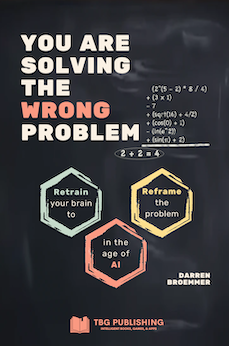From the book "You are Solving the Wrong Problem"Chapter 19: Puzzles
Puzzles are an excellent method for practicing problem-solving skills. The techniques discussed in this book can be directly applied to puzzles, helping to enhance your problem-solving abilities. By engaging in puzzle-solving activities, you can train your brain and become a more proficient problem-solver overall.
One of the key benefits of puzzles is the opportunity they provide to improve critical thinking skills. When faced with a puzzle, you are required to analyze the problem, think creatively, and formulate strategies to reach a solution. These cognitive processes help strengthen your critical thinking abilities and enable you to approach real-life problems more effectively.
Practice is widely regarded as the best way to improve any skill, and problem-solving is no exception. By consistently engaging in puzzles and challenges, you can refine your problem-solving techniques and become more proficient over time. The repetitive nature of solving puzzles allows you to reinforce the strategies and methods discussed in this book, helping them become second nature.
Additionally, puzzles offer a low-stakes, high-reward environment for practicing problem-solving skills. Everyday life problems often come with higher stakes and stress levels. In contrast, puzzles provide a less pressurized setting where you can freely explore different approaches and experiment with problem-solving techniques. This allows you to build confidence in your problem-solving abilities and experience the sense of accomplishment that comes with finding solutions.
In summary, puzzles are a valuable tool for improving problem-solving skills. They offer the opportunity to apply the techniques discussed in this book, train your brain, and enhance critical thinking abilities. By practicing regularly and engaging in puzzle-solving activities, you can become a more effective problem solver and approach real-life challenges with greater confidence.
All solutions are found in the lsat chapter of this book.
Puzzle 1: A warmup puzzle
This puzzle is courtesy of the United Kingdom Mathematics Trust. It's a good one to get started.
This sentence contains the letter e ________ times
Which, if any, of the following words satisfy the sentence when filled in the blank?
seven, eight, nine, ten, eleven
Puzzle 2: The Count to 100 game
This "game" is really a puzzle that goes like this.
You and a partner take turns saying a number between one and nine. The loser is the person who brings the overall total to 100 or more. Do you want to go first or second?
Puzzle 3: Count to 100, take two
Consider a variation of the game where everything remains the same, except that you and your partner can say any number from one to ten. Do you want to go first or second, and what is your strategy? How can you apply similar techniques to this version of the problem?
Puzzle 4: The Monty Hall problem
Imagine you're a contestant on a game show, and you are presented with three doors. Behind one of the doors is a new car. If you choose that door, you win the car. Now, there is a goat behind each of the other two doors. You choose one of the doors, but it isn't opened yet.
The game show host, Monty Hall, who knows what's behind each door, opens one of the other two doors, revealing a goat. You are then given a choice: stick with your initial choice or switch to the remaining unopened door.
The question is: What should you do to maximize your chances of winning the car?
Take a minute to consider this problem. Consider what is the actual question being asked. What is the actual problem we are solving for?
Puzzle 5: The Burning Island puzzle
The Oxford Dictionary says that a red herring is "a clue or piece of information that is, or is intended to be, misleading or distracting." In puzzles, red herrings are intentional. In life, they exist because we live in a complex world.
Consider the following puzzle and remember to focus on what is important. There may or may not be a number of red herrings included.
You are stranded on a rectangular island that is completely covered in dry, combustible forest. It is 10 miles from the west coast to the east coast, and 2 miles north to south. There are extremely high cliffs on all sides of the island, so you cannot jump off into the water. The wind is constant, and always blows from west to east. On Thursday at noon, the entire western edge of the island catches fire. Due to the winds, the fire moves east at a constant rate of 1 mile per hour. You will die if the flames reach you, or you jump off the island. You have a backpack that contains a compass, a calculator, and a print copy of War and Peace, by Leo Tolstoy. How can you survive until Friday?
Puzzle 6: The Clock Face
This problem is also known as the Two Lines Problem. The origin of this puzzle is uncertain, but it is a favorite of mathematicians, puzzle enthusiasts, and online problem-solving communities.
Your task is to divide the clock face using only two straight lines. The numbers in each region of the clock should add up to the same number.

Chapters
2. Step out of Auto-Pilot Mode
3. Your most important skill: Asking Questions
4. Solve any problem using the Five Whys
5. AI Prompting like a Pro
6. Invention over Convention
7. How to Reframe a Problem to your Advantage
8. The Diamond Pattern: First fan-out, then fan-in
9. The Problem Paradox
10. Break free from Cognitive Bias
11. From Complex to Simple
13. Use AI for Data Analysis
14. The Curiosity Rule
15. Improve productivity by eliminating distractions
16. Optimization Problems
17. Greenfield or work within current constraints
18. Managing the most scarce resource: Time
19. Challenge yourself with Puzzles
20. Next Steps
21. Solutions to Puzzles

